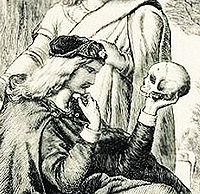Unipolar depression, also known as major depressive disorder, ‘melancholia’ in older times and today commonly referred to in pop culture as simply ‘depression’, is a very high-profile mental disorder affecting up to 6.7% of the population of US adults in a given year1.
The disorder is characterized by a number of symptoms including biological ones such as insomnia, increased receptivity to colds and loss of appetite, as well as more psychological manifestations such as low self-esteem, feelings of hopelessness, social withdrawal, lack of motivation, increased anger or anxiety, reduced joy in old hobbies and, in extreme cases, suicidal tendencies. It is not unheard of for this disorder to incur other issues such as self-harm or alcoholism as a means for the sufferer to try and escape or mitigate these symptoms.

Shakespeare’s Hamlet is a famous fictional figure often diagnosed by literary critics as suffering from depression.
More modern, physiological approaches to treatment for depression have shown that there may be biological causes (and thus, biological treatments). Chemical imbalances in the brain have been targeted as likely culprits for this mood disorders, resulting in sometimes astonishingly fast recovery when corrected, especially alongside some form of psychological or social therapy.
Reference:
1. National Institute of Mental Health (). The Numbers Count: Mental Disorders in America. [ONLINE] Available at: www.nimh.nih.gov/health/publications/the-numbers-count-mental-disorders-in-america/index.shtml#MajorDepressive. [Last Accessed 9.12.2013].
© BrainMass Inc. brainmass.com July 26, 2024, 7:59 pm ad1c9bdddf